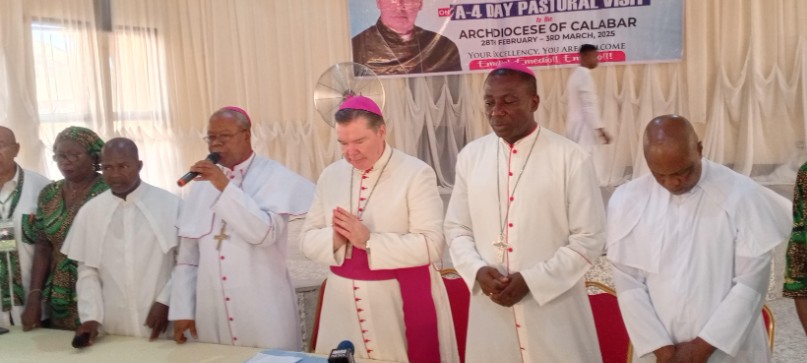Archbishop Michael Francis Crotty, the Apostolic Nuncio to Nigeria, has strongly criticized the practice of paying ransom for kidnapped individuals, arguing that such payments will only promote further criminal activities in society.
He made these remarks in response to journalists during a four-day pastoral visit to the Archdiocese of Calabar which underscored the Apostolic Nuncio’s dedication to fostering unity and strengthening ties within the Catholic Church in Nigeria.
Crotty remarked, “In Nigeria, the Catholic Church has taken a firm stance regarding security issues, particularly concerning the abduction of clergy and church workers. We must address this societal plague at its root.”
He lamented that ransom payments only serve to perpetuate the cycle of kidnapping and reiterated that the Church has consistently stated it will never pay ransom. Instead, the Church aims to work alongside civil authorities tasked with ensuring safety and security and tackling crime effectively.
Crotty described kidnapping as a significant tragedy facing the nation and highlighted the government’s responsibility to protect all citizens from threats.
He emphasised that such problems often stem from security breakdowns that allow criminality to flourish unchecked.
He acknowledged the efforts of Catholic Church leaders in the Archdiocese of Calabar, who are collaborating with various levels of government and civil society to combat this issue.
He stressed the importance of fostering cooperation and trust in security frameworks, advocating for the voiceless, engaging with politicians to promote the common good, and ensuring citizens’ safety.
On the topic of education, Crotty pointed out that the success of missionary efforts in Nigeria is largely attributed to the educational system, which plays a crucial role in helping individuals reach their full potential and in evangelization efforts.
He stated, “Education has been a fundamental value of the Catholic Church since its inception over 2,000 years ago.”
He noted that “education is primarily the responsibility of parents, and the Church supports them in this endeavor. Education is a universal right and essential for personal growth, enabling individuals to achieve their capabilities.
He reiterated that the Church’s missionary activities have always included establishing schools, as education fosters moral values, social responsibility, and prepares individuals to contribute positively to society.
Crotty affirmed that the Catholic Church remains dedicated to education as a core value, serving individuals from all backgrounds, and aiding in the development of future generations to meet societal needs.
The Apostolic Nuncio to Nigeria serves as the Pope’s representative and is acknowledged in international diplomatic law as a Head of State, as the leader of the Holy See, which is the highest authority of the Catholic Church, Tribune Online reports.






